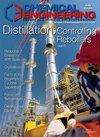散装固体处理
Q Chemical Engineering
引用次数: 13
摘要
自20世纪50年代初开始发展固体固体流动理论以来,固体固体流动领域已经有了很大的发展,这使得设备和测试方法的设计成为可能。数值模拟的最新进展对散装固体处理设备的设计方法产生了重大影响。在本文中,描述了体积流型,测量,及其模拟,以及设备的设计和维护。还讨论了包括筛分、混合和混合在内的特殊考虑。关键词:散装固体;斜槽;设备设计;流;粉本文章由计算机程序翻译,如有差异,请以英文原文为准。
Bulk solids handling
The field of bulk solids flow has been developed considerably since the development of the theory of bulk solids flow began in early 1950s, which allowed the design of equipment and testing methods. More recent advances in numerical modeling have had a significant impact on the design methodology of bulk solids handling equipment.
In this article, bulk flow patterns, measurement, and their simulation, as well as equipment design and maintenance are described. Special considerations including sifting, and mixing and blending, are also discussed.
Keywords:
bulk solids;
chutes;
equipment design;
flow;
powder
求助全文
通过发布文献求助,成功后即可免费获取论文全文。
去求助
来源期刊

Chemical Engineering
工程技术-工程:化工
CiteScore
0.06
自引率
0.00%
发文量
0
审稿时长
6-12 weeks
期刊介绍:
Chemical Engineering is published monthly by Access Intelligence, primarily for chemical engineers and related technical people in the chemical process industries (CPI), as well as at engineering, design and construction companies that serve the CPI. The CPI consist of: chemicals, including petrochemicals; drugs and cosmetics; explosives and ammunition; fats and oils; fertilizers and agricultural chemicals; foods and beverages; leather tanning and finishing; lime and cement; synthetic fibers; metallurgical and metal products; paints and coatings; petroleum refining and coal products; plastics; rubber; soap and detergents; stone, clay, glass and ceramics; wood, pulp, paper and board; other chemically processed products.
 求助内容:
求助内容: 应助结果提醒方式:
应助结果提醒方式:


